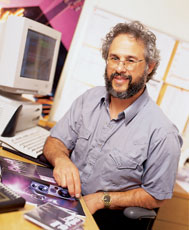By Steve Oppenheimer
(July 2004)
In a world where many of us must perform multiple tasks at once, computers help organize those tasks and store vast amounts of information, enabling us to communicate quickly and easily. And that’s before we hit the Record button and use our computers to work those sonic miracles that we could never create with recording tape and a razor blade.
Because we can do all these things, people increasingly try to do more of them faster, often attempting to work on many tasks at once. But human multitasking, as Larry the O points out in this month’s “Final Mix” column, can become so emotionally and physically taxing and inefficient that it can lead to disaster.
In this month’s feature story, “Keep It Simple,” author Nick Peck offers practical and philosophical responses to some of the problems Larry points out, as applied to working in a personal studio. In essence, Peck explains that while you might have to keep many balls in the air, sometimes you can reduce the number of balls, not toss them quite so high, and generally make juggling them simpler and easier.
Learning to eliminate nonessential tasks and streamline workflow is very important. Facing up to the dangers of multitasking is crucial, as well. But we also have to make more fundamental choices about how many things we should do and, perhaps more important, what sorts of things we should do in our limited time. People’s answers will all differ, of course, and they will probably change at various times in each individual’s life.
For example, when I was learning my trade as a magazine editor, I worked absurdly long hours each day and then went home to do more of the same late into the night and right through the weekends and holidays. I went way beyond what I needed to do to earn my paycheck, and it was rewarding in many ways. I’ve worked hard all my life, but at this time I became a workaholic. Friends and family (including Larry the O) warned me about it, but I loved my work and ignored the danger. Over the years, the nature of my job changed, and I learned to work faster and more efficiently. However, with a few exceptions, my life was still almost entirely devoted to my job.
Then, a few years ago, a close friend (and EM author) died unexpectedly at age 38. I recalled my paternal grandfather’s dying words to me many years ago: “Get it while you can; it won’t last long.” You never know how much time you have left.
So I finally admitted to being a workaholic and changed my lifestyle. It was the best decision I’ve made in a long time. I remain devoted to EM and to our new magazine, MET. I still work hard, but I have reclaimed my evenings and weekends and don’t work on holidays. I pursue a wide variety of personal projects.
I now seek the balance that Larry discusses in his column. Grandpa O, always a man of few words, provided the answer in one sentence.
